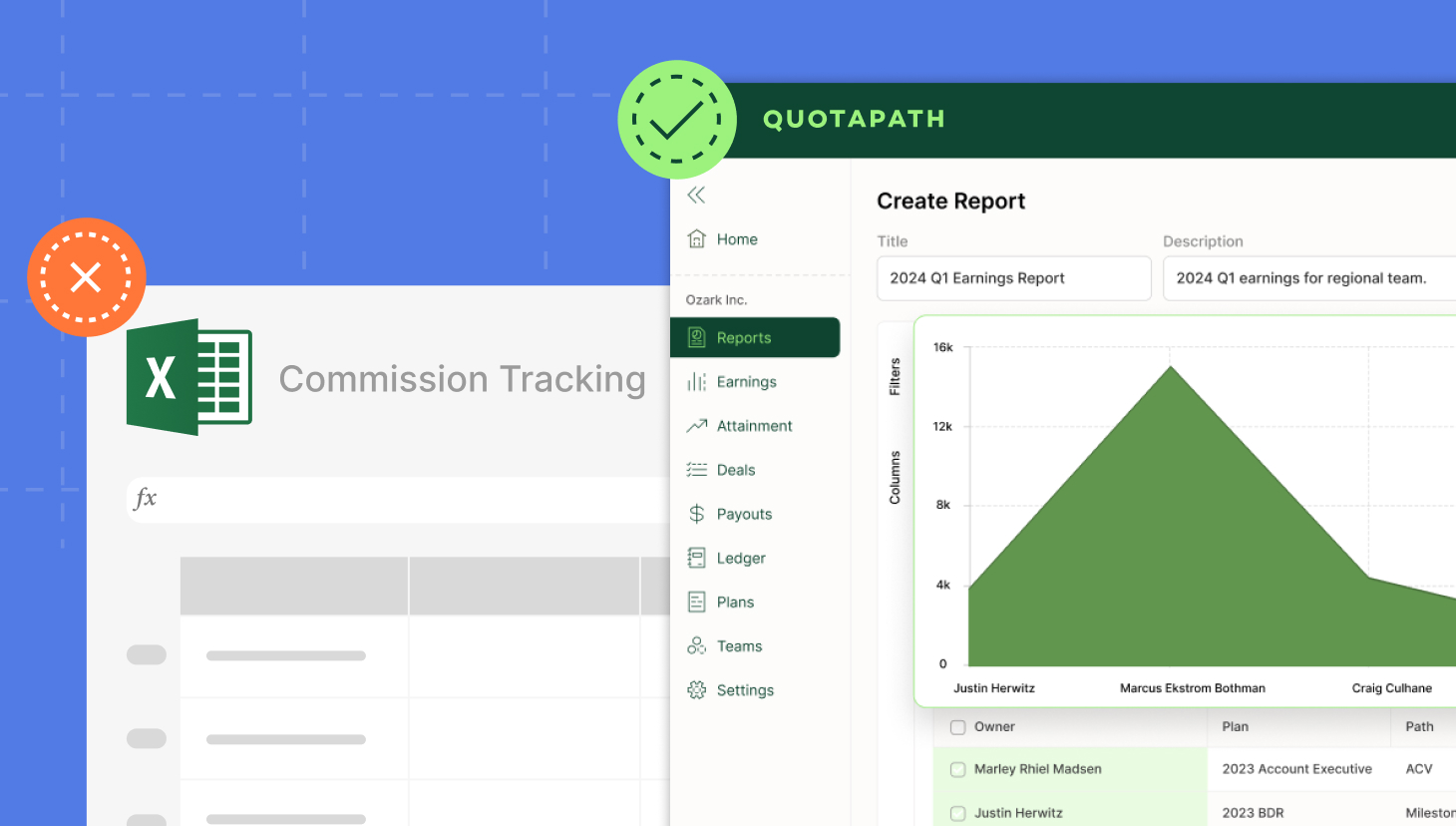You invested your company’s money into a call recording software. Your reps are all recording all their demos and sales calls. There are lots of benefits from recording calls. The most value you’ll get from recorded demos is if you listen to them with your reps and use them for sales coaching. If you’ve taken the time to invest in call recording software, you need to find the ROI. That ROI can come from improved win rates, better sellers, higher average contract values, or better quota attainment.
Every great sales leader I know believes in recording calls and call review sessions. Here are some best practices I’ve picked up from top sales managers through the years.
Coach with Compensation Data
Using QuotaPath, pull up compensaiton plan performance dashboards, and team and rep attainment and earnings reports to identify the most lucrative types of deals for your reps as well as your business.
Learn MoreListen beforehand
The first thing you should do if you want to give feedback for a call is to listen to the whole conversation beforehand. Take notes and mark the call for specific coaching moments. Giving sales coaching like “here are the three moments that you cut off the buyer” is a lot more powerful than ambiguous advice.
This is important because you don’t want to be surprised midway through the call if it takes a sharp turn. If you know the outcome of the call, you can give more direct feedback.
Don’t just use good calls or bad calls
It’s a lot more fun to listen to a call where the deal ends up closing than calls that go poorly. No one wants to revisit their failures, sellers included. However, you have to be willing to listen to your failed calls if you want to get better.
On the flip side, the same can be said for a deal that is a one-call-close! Your sales rep can learn There is always room for improvement on demos, so you shouldn’t focus entirely on the poor calls.
Use the Socratic Method
In teaching, there is a theory called the Socratic Method which is essentially teaching by asking question after question. This works because you’re forcing people to think critically about the way they think. You then help guide them to the right answer instead of just telling them.
I apply this method when it comes to sales coaching. Instead of saying “you need to ask the buyer who else is involved with this decision!” You can ask “at this point in the call do you know who else is involved in the decision? How would you find that out? How could you word a question that would give you that info?”
Share the pause button
This is a simple one, but as a sales manager, you shouldn’t have exclusive control over the pause button. I mean this literally — your team member should be able to pause the recording if they want to ask a question or point something out — and metaphorically — you shouldn’t be the one to give feedback every single time. Your salesperson should be able to identify moments that need improvement or moments that they’re proud of.
Whenever you pause the call recording, you as the sales manager don’t have to be the first one to speak every time. Sometimes it’s valuable to ask your sales rep “how do you feel about that question?” This way, the sales rep will be comfortable speaking up when they feel there is an opportunity to do so. The goal should always be for your sales team to be comfortable listening to calls with you without feeling like they’ll be attacked.
Treat sales coaching like golf coaching
I’m terrible at golf. However, I’ve taken a couple of golf classes, and they were very different. At the start of my first lesson, the coach had me take a few natural swings. He then spent 5 minutes laying out all the things wrong with it. My hands were in the wrong place. My stance was too narrow. Turns out my head was low. Also, my elbows were too tight to my body. It went on and on and after the fifteenth issue with my swing, I tuned it out.
Compare it to my second lesson. My coach took a look at my swing and said “okay, your stance is narrow”. Then they spent half an hour working on my stance with me. Once I was comfortable with that stance, we moved on to another issue. We covered 2 issues in an hour class, but I improved substantially more than my first lesson. What does this have to do with recorded calls? Focus on improving one or two issues with your rep’s demo process instead of trying to fix every little thing that’s wrong. If you try to improve everything that your sales rep does poorly in one session, you’re going to end up with a discouraged salesperson.
Be consistent with your feedback sessions
I had a recurring meeting with each of the people on my sales team for call review sessions. Every week, I would set aside an hour for every person on my team to review calls. I would try to listen to 3 cold calls they made and 1 demo they ran during that hour.
Because this meeting was scheduled and set to happen every week, my sales reps grew accustomed to it happening on a regular cadence. If you don’t have a consistent schedule for these sales demo reviews, salespeople may perceive them as a punishment. You might have too many people on your sales team to provide feedback every week. Instead, you can push it to every other week or set up a peer review session. Ensure that you are doing these call reviews on a regular basis because otherwise the guidance won’t stick.
Bonus: Speed up the call
Here’s a bonus technique I picked up as a sales rep. Like a lot of people, I hated the sound of my own voice. It took me entirely out of my comfort zone. It’s important to take salespeople out of their comfort zone, but it shouldn’t be because of their own voice. This is a result of sounding higher pitched than we hear our own voices in our heads.
I discovered that if I sped up the call recording even just 15%, it no longer sounded like me. It was higher pitched, but everything was higher pitched! It totally resolved any issues with listening to my own voice. If you’re doing sales coaching with a rep that expresses this concern, try this trick! This has the added benefit of allowing you to listen to calls more quickly.
If you’re a VP of Sales or a CRO, training on how to listen to demos should be part of your sales management training. Don’t assume that because someone is a seasoned sales manager, they are inherently great at sales coaching. Sometimes the sales coaches need coaching! Ongoing sales management training is just as important as sales training for reps.
I think the ease and technology behind call recording is one of the biggest improvements to sales in the past decade. Every sales organization should be taking advantage of software (or hardware) to record their sales calls and cold calls. But don’t forget, in order to maximize the value of these recorded calls, you need to put sales coaching in play. If you want to track your reps’ performance, that’s where QuotaPath comes in! You can track quota attainment, calculate commissions, and reps can set individual financial or performance goals using MyPath.



